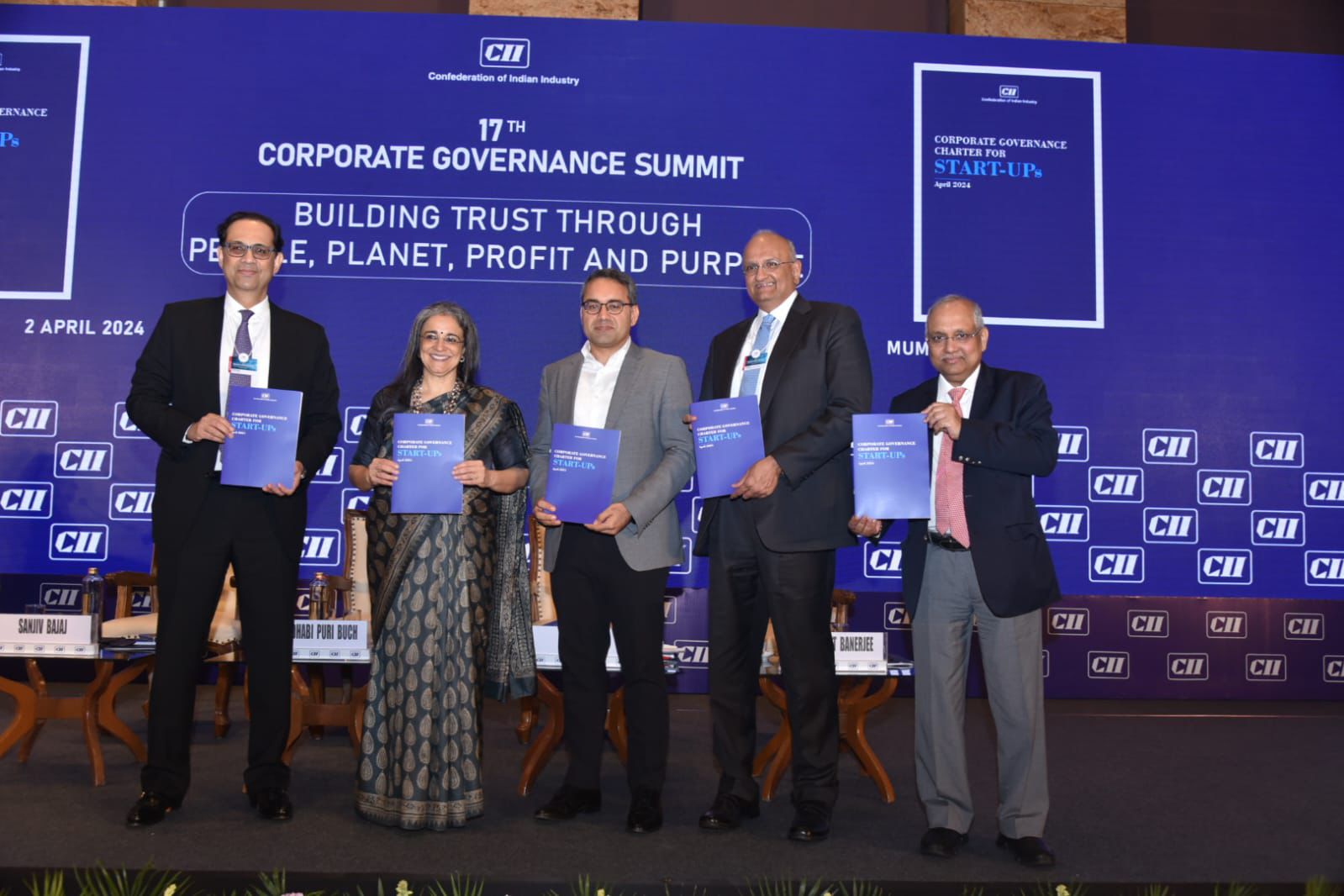CII held in Mumbai its 17th Corporate Governance Summit, themed on ‘Building Trust through People, Planet, Profit and Purpose’

FinTech BizNews Service
Mumbai, April 2, 2024: SEBI Chairperson Ms Madhabi Puri Buch released two reports on Tuesday at CII’s 17th Corporate Governance Summit, themed on ‘Building Trust through People, Planet, Profit and Purpose’, held in Mumbai.
Ms Madhabi Puri Buch released CII Report titled “The DPDP Act & Enterprises in India: Privacy for the Board” and “CII Corporate Governance Charter for Start-Ups”. The first report is focussing on the Digital Personal Data Protection (DPDP) Act's impact on enterprises in India. It will help companies and boards in smooth adoption and timely compliance with the new law.
Th second Report titled “CII Corporate Governance Charter for Start-Ups” contains the voluntary recommendations on corporate governance appropriate for Startups based on the specific stages of the life cycle of Start-up, to be used by Startups as a Ready Reckoner.
The 17th edition of the CII Corporate Governance Summit enabled important discussions on corporate governance in Startups and family businesses, ESG and Cyber Risk and data privacy. Ms Madhabi Puri Buch, Chairperson, Securities and Exchange Board of India (SEBI) delivered the keynote address at the Inaugural session of the Summit.
The first plenary session of the Summit focused on “Building Trust and Stakeholder Engagement” wherein Mr Ajay Bahl, Co-Founder & Managing Partner, AZB & Partners, Mr Hitendra Dave, Chief Executive Officer, India, HSBC India, Mr Kunal Bahl, Co-founder & Chairman, Ace Vector Group & Co-Founder & Managing Partner, Titan Capital, Mr Nehal Vora, Managing Director & Chief Executive Officer, Central Depository Services Limited, Mr Sundararaman Ramamurthy, Managing Director & Chief Executive Officer, Bombay Stock Exchange and Mr Ankit Sharma, Chief Regulatory Officer, National Stock Exchange of India Limited, deliberated on building a foundation to earn and measure trust across stakeholder groups, trust agenda being a strategic business priority for CEOs and Boards and navigating and strengthening the Startup Story.
The second plenary session was held on the topic “Governance in Family Businesses” and Dr Janmejaya Sinha, Chairman, India, The Boston Consulting Group, Ms Shobana Kamineni, Past President, CII and Executive Vice Chairperson, Apollo Hospitals Enterprise Limited, Mr Farhad Forbes, Co-Chairman, Forbes Marshall and Mr Anthony Crasto, President, Risk Advisory, Deloitte India, traced the developments in corporate governance as a catalyst for success from growth to resilience. Besides discussions on Board integrity, ethics, effectiveness and resilience and Board preparedness towards emerging risks and regulations were also held.
“ESG imperatives for Boards” were discussed at the third plenary session of the Summit. Mr Viral Thakker, Partner and Leader Sustainability and Climate, Deloitte, Mr B Thiagarajan, Managing Director, Blue Star Limited, Mr Amit Chandra, Chairman, Bain Capital, Mr Ranjan Bhattacharya, Managing Director - Chief of Staff and Head of Strategy, HSBC India and Mr Prerak Ved, Partner, AZB & Partners had in-depth deliberations revolving around engraving ESG in Board decision-making to address stakeholder expectations and assurance requirements, ESG risk management with achieving net zero standards and Board’s role in climate challenges and changing societal expectations.
The fourth plenary session was held on the subject of “Cyber Risk and Data Privacy for Boards” wherein Mr R Mukundan, Managing Director & Chief Executive Officer, Tata Chemicals Ltd., Ms Padmaja Chunduru, Managing Director & Chief Executive Officer, National Securities Depository Limited, Mr Tarun Kaura, Partner, Deloitte India, Mr Ajay Upadhyay, Practice Head - Compliance & Investigation / White–Collar Crime, AZB & Partners and Mr M D Ranganath, Member of the Board, HDFC Bank discussed white-collar crimes and fraud governance, digital governance and data protection and cybersecurity governance.
CII launches Publication on The DPDP Act & Enterprises in India: Privacy for the Board
Confederation of Indian Industry (CII) launched the Publication titled “The DPDP Act & Enterprises in India: Privacy for the Board” prepared in partnership with Deloitte. The publication highlights the critical importance of data privacy in today's digitally driven world, focusing on the Digital Personal Data Protection (DPDP) Act's impact on enterprises in India.
Globally, risk of digitization in terms of compromise with data privacy has long been identified and significant steps taken towards development of laws to protect data privacy rights. In India, the Digital Personal Data Protection Act, 2023 (DPDP Act) has been enacted in August 2023 with an aim to curb and regulate the negative implications on data privacy. From the Board point of view, DPDP Act calls for identifying the impact of the law on the entity, governance mechanism to ensure compliance, processes for smooth implementation, monitoring mechanism, measures to increase awareness and engrain it in entity’s culture, risk mitigation plan, escalation matrix and to build stakeholder trust.
Speaking at the launch, Mr Chandrajit Banerjee, Director General, Confederation of Indian Industry highlighted that the enactment of DPDP Act requires entities to rewire their business operations, processes and strategies to ensure compliance with this new law in letter and essence. As a governance imperative, it requires Boards of companies to take the lead in comprehending the law and ensuring that the statutory/ compliance requirements percolate down in the organization at all levels and across all functions uniformly. He hoped that the publication will enable businesses and especially Boards ensure smooth transition, eased and timely compliance with the new law.
Speaking about the way forward for boards, Tarun Kaura, Partner and Leader - Cyber, Deloitte India, said, “In an era where data is both an asset and a liability, it is important for boards to consider integrating comprehensive risk management and resilient oversight to navigate the complexities of data privacy. This involves not just adherence to regulations but fostering a culture where privacy is ingrained in the fabric of operations. Strategic investments in privacy-enhancing technologies and a commitment to continuous monitoring and education will be pivotal. As we stride into a future where data privacy shapes consumer trust and enterprise success, the Board's role transcends regulatory compliance, championing a privacy-first approach that secures data while unlocking its value sustainably and ethically.”